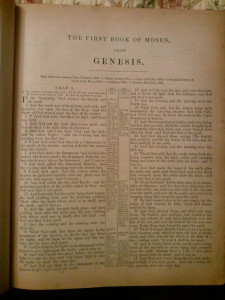I am excited to announce the completion of our first Bible Info Graphic. It is the first in our Journey Through James series. You can view the info graphic by clicking on the link below. We plan to make all of our info graphics available for free on our website. Until then, stay tuned!
Fascinating Fossil Discovered… In a Museum
According to several recent articles, a fascinating fossil was recently discovered in a German museum – of all places. The fossil is causing quite a stir because of its snake-like body with four distinct limbs. In fact, its scientific name, Tetrapodophis amplectus, loosely translates as “four-legged, hugging snake.”

Of course, a lot of controversy surrounds the finding. For instance, not all the scientists are convinced it is a snake. Michael Caldwell, a paleontologist at the University of Alberta in Edmonton, Canada, had this to say:
I honestly do not think the fossil represents the remains of a snake. It completely lacks key features of the vertebral column that would make it a squamate [scaled reptile] and more specifically a snake. If the rest of the animal is not a squamate, then teeth do not make you a snake.
And there is also the debate between the evolutionists and creationists.
And the Lord God said unto the serpent, Because thou hast done this, thou art cursed above all cattle, and above every beast of the field; upon thy belly shalt thou go, and dust shalt thou eat all the days of thy life: and I will put enmity between thee and the woman, and between thy seed and her seed; it shall bruise thy head, and thou shalt bruise his heel. Genesis 3:14-15
To read more about this recent discovery, read here:
Off The Shelf: J.R. Tolkien’s Happy Marriage Was No Fiction
J.R.R. Tolkien, author of The Hobbit and The Lord of the Rings, was happily married for 55 years! In a day and age where no-fault divorce is supreme, his marriage stands as a testament of the love they shared for each other. In a letter to his son, he gave this candid advice:

Men are not [monogamous]. No good pretending. Men just ain’t, not by their animal nature. Monogamy (although it has long been fundamental to our inherited ideas) is for us men a piece of revealed ethic, according to faith and not the flesh. The essence of a fallen world is that the best cannot be attained by free enjoyment, or by what is called “self-realization” (usually a nice name for self-indulgence, wholly inimical to the realization of other selves); but by denial, by suffering. Faithfulness in Christian marriages entails that: great mortification.
For a Christian man there is no escape. Marriage may help to sanctify and direct to its proper object his sexual desires; its grace may help him in the struggle; but the struggle remains. It will not satisfy him—as hunger may be kept off by regular meals. It will offer as many difficulties to the purity proper to that state as it provides easements.
No man, however truly he loved his betrothed and bride as a young man, has lived faithful to her as a wife in mind and body without deliberate conscious exercise of the will, without self-denial. Too few are told that—even those brought up in “the Church.” Those outside seem seldom to have heard it.When the glamour wears off, or merely works a bit thin, they think that they have made a mistake, and that the real soul-mate is still to find. The real soul-mate too often proves to be the next sexually attractive person that comes along. Someone whom they might indeed very profitably have married, if only—. Hence divorce, to provide the “if only.”
And of course they are as a rule quite right: they did make a mistake. Only a very wise man at the end of his life could make a sound judgement concerning whom, amongst the total possible chances, he ought most profitably have married! Nearly all marriages, even happy ones, are mistakes: in the sense that almost certainly (in a more perfect world, or even with a little more care in this very imperfect one) both partners might have found more suitable mates. But the “real soul-mate” is the one you are actually married to. In this fallen world, we have as our only guides, prudence, wisdom (rare in youth, too late in age), a clean heart, and fidelity of will…
(Letters of J.R.R. Tolkien, pp. 51-52)
It’s pretty thought-provoking if you ask me, and all of us men would do well to heed this advice. You can read the ful article about Tolkien’s marriage here:
1,500 Year Old Charred Scroll Deciphered!
The Israeli Antiquities Authority has announced that a charred scroll dating back 1,500 years has been deciphered. Guess what they found? If you guessed a Biblical text, you’re right.

The scroll was found in a synagogue at the Ein Gedi site near to where the Dead Sea Scrolls were found in some caves. Archaeologists have dated the scrolls around 500 A.D., making them the oldest Biblical text next to the Dead Sea Scrolls. What the charred scrolls contained had been a mystery for some time. But thanks to CT scans and some modern, digital-imaging software, researchers with the University of Kentucky were able to read a passage out of the book of Leviticus. It is the first time that archaeologists have found a Torah scroll in a synagogue.
You can read about the full discovery here:
And Heaven and Nature Sang!
Today, July 17, marks the birthday of one the greatest hymn writers in Christian history – Isaac Watts. Born to parents who disagreed with the Anglican church, Isaac was born when his father was imprisoned for his beliefs and nursed by his mother outside the prison walls. Isaac was very gifted from an early age, writing this poem (an acronym of his name) when only seven years old:
“I” – I am a vile, polluted lump of earth
“S” – So I’ve continued ever since my birth
“A” – Although Jehovah, grace doth daily give me
“A” – As sure this monster, Satan, will deceive me
“C” – Come therefore, Lord, from Satan’s claws relieve me.“W” – Wash me in Thy blood, O Christ
“A” – And grace divine impart
“T” – Then search and try the corners of my heart
“T” – That I in all things may be fit to do
“S” – Service to Thee, and Thy praise too.
His hymn writing was very controversial during his day as many accused him of forsaking the inspired hymnbook of the Psalms in exchange for his hymns. Some of those hymns include At the Cross, Alas and Did My Savior Bleed, When I Survey the Wondrous Cross, We’re Marching to Zion, I Sing the Mighty Power of God and Joy to the World.

Whenever you’re in London, visit the Dissenter’s Graveyard at Bunhill Fields near the Wesley Chapel. Here, due to their dissenting views, are the buried remains of those not allowed in the traditional church cemeteries. Graves that are hundreds of years old lie peacefully; among them are those of John Bunyan, Susannah Wesley, John Rippon and Isaac Watts.
You can read a full article about this here:
Light the Lamp! Tour of the Tabernacle

The menorah was one of the most interesting pieces of furniture in the Tabernacle. It consisted of seven lamps on a single lamp post and was the primary source of light in he Holy Place.
And the Lord spake unto Moses, saying, Speak unto Aaron and say unto him, When thou lightest the lamps, the seven lamps shall give light over against the candlestick. And Aaron did so; he lighted the lamps thereof over against the candlestick, as the Lord commanded Moses. Numbers 8:1-3
The phrase shall give light over against the candlestick is an interesting one; it literally means the lamps will light up the lamp stand. The idea is that the six outer lamps, when light, would illuminate the one central lamp, accentuating its light. The menorah represented God’s presence among His people. It has become an emblem for the nation of Israel. But its presence in the Holy Place is a reminder to Christians that we are the light of the world. Our light, however, has one primary purpose – to accentuate the Light, the Savior.
To read more about this visit:
Debt, Forgiveness, & The Lord’s Prayer
 You will not get very far in any Bible study on forgiveness before you get to the classic passage often referred to as the Lord’s prayer.
You will not get very far in any Bible study on forgiveness before you get to the classic passage often referred to as the Lord’s prayer.
And forgive us our debts, as we forgive our debtors. Matthew 6:12
As I prepared to teach on forgiveness (the theme of Vacation Bible School this year was “Forgiveness”). I came across this very verse and my mind began to churn as I thought about the relationship between the two words debts and forgive. In the original language, the phrase is καὶ ἄφες ἡμῖν τὰ ὀφειλήματα ἡμῶν and literally means and forgive us what owe. The meaning of τὰ ὀφειλήματα is very clearly moral faults i.e. trespasses. The root verb from which it is derived means should or ought, and it gives us the impressions that we are under moral obligations which we have failed to perform or hold up. In fact, some of the Old English versions read, “And forgive us our gyltas i.e. guilts… Matthew 23:18 translates the same word as guilty.
And, Whosoever shall swear by the altar, it is nothing; but whosoever sweareth by the gift that is upon it, he is guilty.
In another passage in Matthew, Christ told the parable of two servants: one who owed the master a great sum of money while the other owed his fellow servant a small sum. The master forgave the debt of the servant who owed him a great deal, but this servant did not forgive the small sum owed to him by his peer. In this passage, Matthew also uses words derived from the same root word of τὰ ὀφειλήματα. Again, its very interesting to note the connection between debt and forgiveness.
The importance of all of this lies in the answer to the simple question, Why will God forgive me? As sinners, we are in debt i.e. moral obligation. The law demands death for such rebellion. As we like to say, It’s time to pay for what we’ve done. But Christ paid our sin debt in our place and rose again to promise us eternal life with Him. So why will God forgive me? Because of what Jesus did for me when He died on the cross.
And be ye kind one to another, tenderhearted, forgiving one another, even as God for Christ’s sake hath forgiven you. Ephesians 4:32
The debts are forgiven; the price is paid; we are redeemed. Christianity is filled with terminology that illustrates to us the relationship between these two words debt and forgiveness; and it all started with Christ’s famous prayer.
To read an interesting article on this click here:
http://www.patheos.com/blogs/geneveith/2015/07/debt-guilt/#disqus_thread
Marble Statue Discovered in the Negev
The Negev Desert covers much of the southern portion of Israel. Recently, archaeologists have uncovered a marble statue of a dolphin believed to be associated with the Greek goddess Artemis, the goddess of love. A similar dolphin has already been discovered with the Greek goddess. Archaeologists have dated the statue to be around 2,000 years old which would place it right around the time of Christ and the early New Testament church.
The Greek goddess Artemis was the goddess of love; and her worship was often accompanied by extreme immorality. In Ephesus, a very ornate Temple was constructed and silversmiths made a living by selling statues of the goddess to worshipers. These silversmiths would be at the center of a dispute with the Apostle Paul during his stay there, and a riot was the result.
You can read the full article about the discovery here:
Nautical Terms & The Epistle of James
 Many have called the Epistle of James the “Proverbs” of the New Testament. One reason is because of the practical teaching found in its chapters. Another reason is because of its frequent use of nature and human interaction as a vehicle for spiritual truth. One such example is the nautical terms found throughout the the epistle.
Many have called the Epistle of James the “Proverbs” of the New Testament. One reason is because of the practical teaching found in its chapters. Another reason is because of its frequent use of nature and human interaction as a vehicle for spiritual truth. One such example is the nautical terms found throughout the the epistle.
One key verse in the first chapter of this epistle reads:
Every good gift and every perfect gift is from above, and cometh down from the Father of lights, with whom is no variableness, neither shadow of turning.
This verse is the keystone verse of the epistle because it holds everything together. And how does James tie it all together? By using nautical references to the ancient art of navigation. The stars, with their fixed points in the sky, provide guidance and consistency by which ancient sea vessels could navigate the waters. Essentially, James was helping his audience navigate successfully through their immediate storms of persecution and suffering. This was his object for writing – the illustration, i.e. the nautical terminology, was the vehicle.
And this was not the only time James uses such terminology in his epistle. He references the waves of the sea being driven and tossed. He commands “Do not err,” a term meaning “to drift away.” He reminds that the untamed tongue is like a ship without a rudder. The language of the epistle is so descriptive that you can almost put yourself on one of the boats on the Sea of Galilee during a storm – maybe that is what James had intended all along for these early Christian disciples.
A Pioneer of Freedom of Conscience
In the wake of several supreme court decisions, many questions regarding the future of religious freedom and freedom of conscience have surfaced. In many respects, the ramifications of these rulings are yet to be seen; and that is why it is good to take a deep breath and look back at how Christians have responded in the past when these sort of issues have arisen.
You see, America did not always have religious freedom, but thanks to one pioneer in this realm of freedom, the foundation was laid -and the rest is history.
That pioneer was Roger Williams. Driven from his own roots in England and again from Massachusetts as a religious refugee, Roger Williams set out to establish a colony with religious freedom. He once said:
Men’s consciences ought never to be violated … for a religion that must be upheld by violence, is a religion that cannot be true.
Williams would eventually purchase land from the Native Americans and formed a new colony. Indeed, his colony, Rhode Island, would be home to many religious refugees, and his ideas would form the backbone for religious freedom in this country. When told by the Massachusetts governor to repent of such beliefs and move back, Williams refused with this reply:
I cannot; for I feel safer among the Christian savages, than I do among savage Christians.
To read a thought provoking article about Roger Williams and his beliefs about religious freedom and freedom of conscience, please look up the following:
